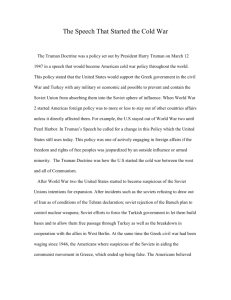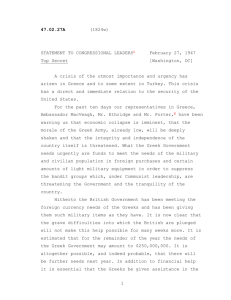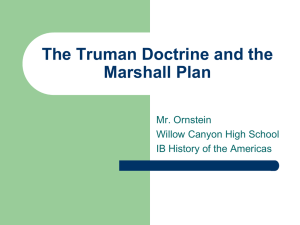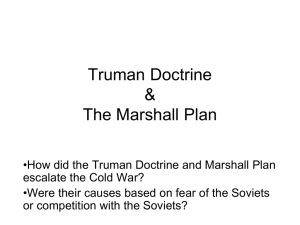Harry Truman and the Truman Doctrine
advertisement
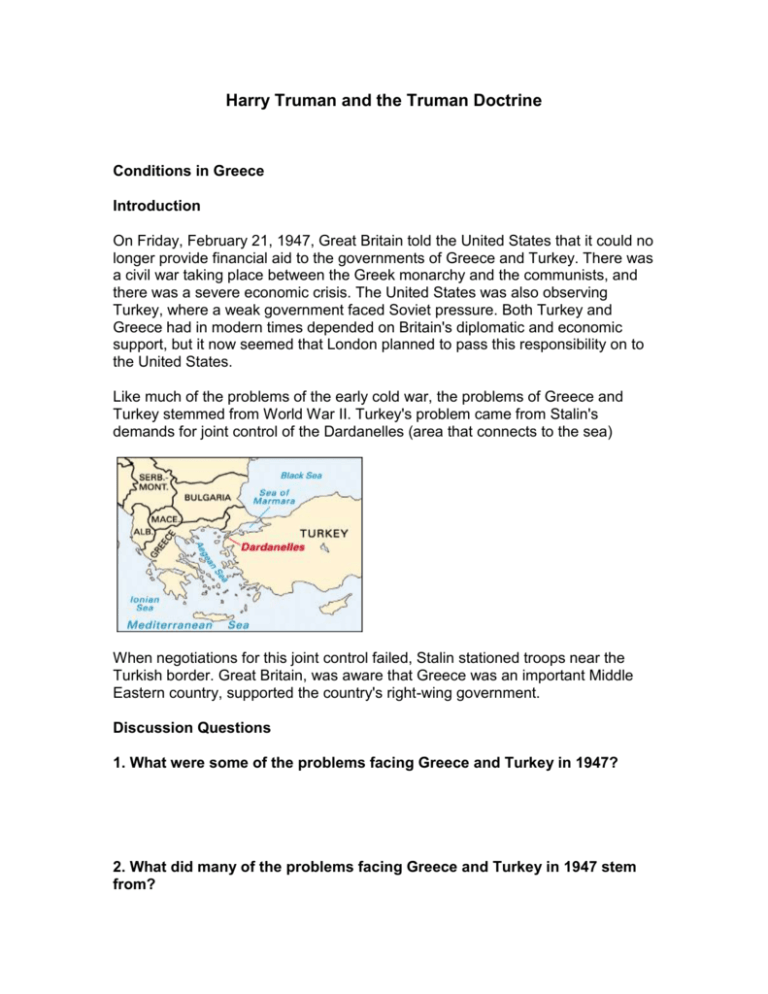
Harry Truman and the Truman Doctrine Conditions in Greece Introduction On Friday, February 21, 1947, Great Britain told the United States that it could no longer provide financial aid to the governments of Greece and Turkey. There was a civil war taking place between the Greek monarchy and the communists, and there was a severe economic crisis. The United States was also observing Turkey, where a weak government faced Soviet pressure. Both Turkey and Greece had in modern times depended on Britain's diplomatic and economic support, but it now seemed that London planned to pass this responsibility on to the United States. Like much of the problems of the early cold war, the problems of Greece and Turkey stemmed from World War II. Turkey's problem came from Stalin's demands for joint control of the Dardanelles (area that connects to the sea) When negotiations for this joint control failed, Stalin stationed troops near the Turkish border. Great Britain, was aware that Greece was an important Middle Eastern country, supported the country's right-wing government. Discussion Questions 1. What were some of the problems facing Greece and Turkey in 1947? 2. What did many of the problems facing Greece and Turkey in 1947 stem from? 3. Why was it important to the United States that the spread of communism be halted before it reached Greece? Conditions in Greece Greece is not a rich country. Lack of good natural resources has always forced the Greek people to work hard to make both ends meet. When allies entered Greece they found that the retreating Germans had destroyed virtually all the railways, roads, port facilities, communications, and merchant marine. More than a thousand villages had been burned. Eighty-five percent of the children were tubercular (a disease in the chest). Livestock, poultry, and other animals had almost disappeared. Inflation (a rise in the level of prices) had wiped out practically all savings. President Harry S. Truman, March 12, 1947 in an address recommending aid to Greece and Turkey. Discussion Questions: 1. Why did the Greek people have a difficult time of "making both ends meet"? 2. What does it mean for a child to be tubercular? Photograph The conditions under which Greek children lived in 1945 were devastatingly harsh and painful. Starvation was a part of everyday life for a child, many children were orphaned, and eighty-five percent suffered from a terrible lung disease, tuberculosis (a terrible lung disease) Truman Doctrine On Friday, February 21, 1947, the British Embassy informed the U.S. State Department officials that Great Britain could no longer provide financial aid to the governments of Greece and Turkey. Americans had been monitoring Greece's crumbling economic and political conditions. The United States had also been following events in Turkey, where a weak government faced Soviet pressure. When Britain announced that it would withdraw aid to Greece and Turkey, the responsibility was passed on to the United States. In a meeting between Congressmen and state department officials it was stated that more was at stake than Greece and Turkey, for if those two key states should fall, Communism would likely spread south to Iran and as far east as India.. Addressing a joint session of Congress on March 12, 1947, President Harry S. Truman asked for $400 million in military and economic assistance for Greece and Turkey and established a doctrine, the Truman Doctrine, which would guide U.S. diplomacy for the next forty years. President Truman declared, "It must be the policy of the United States to support free peoples who are resisting attempted subjugation (to control, enslave) by armed minorities or by outside pressures." However, one thing is for certain, the Truman Doctrine signaled America's post war embrace of global leadership. Discussion Questions: 1) What country could no longer support Greece and Turkey? 2) Why did the United States step in to support Greece and Turkey 3) Why did Truman as for $400 million dollars from congress?


